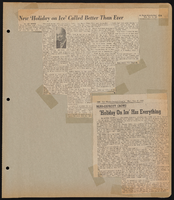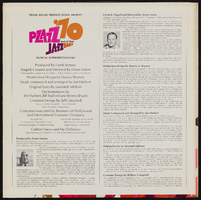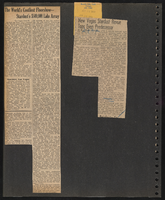Search the Special Collections and Archives Portal
Search Results
Hazel Baker Denton Photograph Collection
Identifier
Abstract
The Hazel Baker Denton Photograph Collection (1910-1961) is comprised of photographic prints and one negative of the Denton family and friends, primarily taken in Nevada and Utah. Many photographs depict life in small Nevada towns, particularly Caliente. Photographs also depict Utah, Oregon, Washington D.C., and California, and unidentified desert and forest landscapes throughout the American West.
Archival Collection
Charles A. Hendel Notebook
Identifier
Abstract
The Charles A. Hendel Notebook is comprised of one notebook of poetry and prose written by Charlie Hendel between 1960 and 1976. Topics include the state of Nevada, World War II, American nationalism, and biographical materials about Charles Hendel.
Archival Collection
Nevada Division of State Parks Photograph Collection
Identifier
Abstract
The Nevada Division of State Parks Photograph Collection (approximately 1910-1940) contains black-and-white photographic prints and some corresponding negatives that depict state parks and recreational areas throughout southern Nevada. The images also portray Lake Mead, Hoover Dam, Logandale, the Valley of Fire, and Mount Charleston as well as images of actors filming on location in southern Nevada.
Archival Collection
Richard Bryan oral history interviews
Identifier
Abstract
Oral history interviews with Richard Bryan conducted by Kristin Guthre on November 10, 2011 and an unknown date for the Boyer Early Las Vegas Oral History Project. Bryan begins by discussing his father’s time as a law student in Washington, D.C. and the influence his father had on his decision to pursue law. Bryan then chronicles moving to Las Vegas, Nevada in the 1940s and growing up in the Huntridge Community near Charleston Boulevard. Bryan recounts attending both the University of Nevada, Reno and the University of California, Hastings College of the Law in San Francisco, California. Bryan describes his experiences in the Las Vegas District Attorney’s office and the Army Reserve. He then recalls his political career as a member of the Nevada Senate, his role as the Attorney General of Nevada, the Governor of Nevada, and as a United States Senator. Lastly, Bryan discusses political issues in Nevada and the United States during his time in office such as debates about renewable energy, environmentalism, and preservation.
Archival Collection
Flora and Stuart Mason oral history interview
Identifier
Abstract
Oral history interview with Flora and Stuart Mason conducted by David G. Schwartz on February 27, 2010 for the Remembering Jay Sarno Oral History Project. Flora Mason begins by discussing the relationship between her family and the Sarnos. Mason describes that she and her husband socialized with Jay and Joyce Sarno in the 1960s because they lived on the same street in Las Vegas, Nevada. Stuart Mason recounts how the Sarnos were incredibly friendly and Jay occasionally invited him to play golf. Mason then chronicles his role as a contractor and the work he did for Jay Sarno throughout his career. He talks about how many of the development ventures of Sarno's were funded by Jimmy Hoffa and the Teamster’s Union. Lastly, Mason discusses how Sarno understood the gaming industry more than any other casino operator and how that was attributed to the success of Caesars Palace.
Archival Collection
Jay C. Sarno Jr. oral history interview
Identifier
Abstract
Oral history interview with Jay C. Sarno Jr. conducted by David G. Schwartz on July 10, 2008 for the Remembering Jay Sarno Oral History Project. Sarno begins by discussing how his parents met in the early 1950s in Miami, Florida and were married within six weeks. Sarno then describes his family moving to Las Vegas, Nevada in 1965 and living in the Dunes Hotel for the first three weeks. Sarno then chronicles his parents’ marriage and their divorce in the 1970s. Sarno then recounts his father’s relationship with Jimmy Hoffa and Allen Dorfman and the visits Hoffa made to Las Vegas to see his father. Sarno talks about the way his father treated him and his brother differently than his sisters. Lastly, Sarno discusses how he and his siblings were surprised their father owed the Internal Revenue Service over one million dollars at the time of his death.
Archival Collection

Transcript of interview with Eva Garcia Mendoza by Elsa Lopez and Barbara Tabach, September 25, 2018
Date
Archival Collection
Description
On the corner of 7th street and Clark, and beside the tennis courts of Las Vegas Academy, stands the law office of attorney Eva Garcia Mendoza. Eva has worked in her office since 1982, and in this time she has helped the Las Vegas community work through civil and immigration cases besides aiding in a myriad of other ways. Eva Garcia Mendoza was born in 1950, in the town of McAllen, TX-an environment that perpetuated hatred of Mexican Americans. Eva recalls the racism she endured; for instance, being spanked if she spoke Spanish in school, and her family facing job discrimination because of her skin color or her last name. Being an ethnic and financial minority was difficult, and Eva remembers nights as a child when she would cry herself to sleep. Eva showed resilience in the face of adversity as she states, “you rise to the level of your teachers’ expectations.” With the encouragement of her band professor, Dr. L.M Snavely, she began higher education at Pan American College. She moved to Las Vegas in 1971 and began to work before being accepted at UNLV to study Spanish literature. She graduated in the class of 1973. In 1975, Eva applied to become a court interpreter, a decision that would drastically change the trajectory of her career. She earned the coveted position and began to work beside Judge John Mendoza who was the first Latino elected to public office in the state of Nevada. Several years later John and Eva would wed. Judge Mendoza passed away in 2011. Eva talks about how extraordinary his legacy is-from his professional achievements to a story about his v football days and the 1944 Dream Team, this true story even piqued the interest of Hollywood writers. Through her work, Eva began to notice how she was more than qualified to become a lawyer herself, so she applied and gained a full ride scholarship to the Law School of San Diego University. Eva describes the struggles of attending school in San Diego while her spouse and children were home in Las Vegas. Despite the financial difficulties, being one of few minority students, and becoming pregnant her second year, Eva was able to finish her remaining university credits by returning to Las Vegas and working with Judge Mendoza. Together, they started the Latin Bar Association. Eva began her own practice in 1981 and would later partner with Luther Snavely, who was the son of her band teacher that helped her to attend college so many years back. Today, Eva has a new partner at her office and hired her son to work as a secretary. Eva also tells of the office’s mysterious history, of which includes a ghostly figure many clients claimed to have seen in the reception room. Eva recounts many of her professional achievements, such as petitioning to start the American Immigration Lawyers Association, Nevada Chapter, representing celebrities, winning the unwinnable cases such as against the Nevada Test Site. Eva talks about current events, such as today’s immigration laws, the discriminatory practices of revoking birth certificates from those born in Brownsville, TX., and about the importance of the #MeToo movement. Eva and her family have a great fondness for Las Vegas. The support for the Latinx community in Las Vegas greatly contrasts that which she experienced as a child in southern Texas. She describes wanting to take her children and grandchildren to visit her old home in McAllen, TX where her family grew up on the “wrong side of the tracks.”
Text



